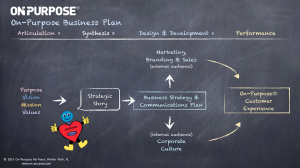Tactical terror is on the face of many a business person these days thanks to the fundamental shift in marketing due to the internet, especially as it relates to social media. Despite all the change, the core of marketing remains much the same as it has for the past 50 years.
In today’s On-Purpose® Business Minute, may I introduce you to the importance of purpose in your marketing strategy and plans?
Purpose brings the power, spirit, or juice to the business model and marketing plan that engages employees, customers, and shareholders alike, yet each differently.
Before you design that new website or write that new brochure or ad, please give the fundamentals of great marketing the investment of your time and energy on the front end. It will save you a ton of time and money on the back end.
Having the fundamentals of marketing in place provides a higher probability that your goals will be met or exceeded.
- Regardless of your company size, do you feel overwhelmed, confused, or frustrated with your present marketing strategy and plans?
- Are you facing the tactical terror of chasing your tail and not getting the results you want?
Please place On-Purpose Partners CMO Services on your mind to help you order, focus, build, and expand your business so it can go to the next level of performance. If you need help, please drop me an email at kwmccarthy@on-purpose.com.
As promised, here is a link to the Marketing Mix concept by Jerome McCarthy, the author of Basic Marketing (and who is not related to me).

